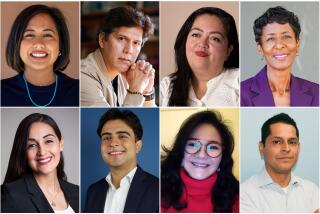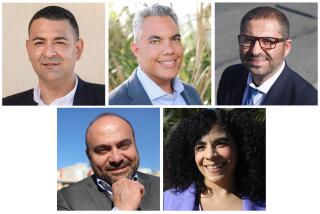We need more mayoral debates. That’s right, more!
- Share via
So, I asked the candidates Tuesday night: How many mayoral debates does this one make?
Forty-two and a half, Eric Garcetti said, in a bemused tone.
A half debate? Maybe that was one where some of the principal candidates weren’t there. Or a debate so stricken with debate fatigue that it seemed like only half a debate.
ENDORSEMENTS: Los Angeles City Elections 2013
Never mind. The actual number is “more than 30,” and I added one Tuesday night, moderating a debate sponsored by civic and residents’ groups in Northeast L.A. Four of the five principle candidates were there; Wendy Greuel was out of town.
I calculated at least 200 people there in Ramona Hall alongside the Arroyo Seco. The turnout was a gratifying tribute to the civic interest of residents, who could have stayed home to watch the State of the Union speech or the latest on the Chris Dorner firefight up in Big Bear.
Norman Rockwell’s famous New England town hall painting captured the spirit here, but not the 21st-century faces: there were young hipsters in knit caps, and elderly people in knit caps. There were Latinos listening to the debate’s Spanish translation. But their intent was the same as Norman Rockwell’s models’. They wanted to know what these candidates could do, as mayor, to fix their neighborhood, their city.
VIDEO: Interviews with L.A.’s mayoral candidates
The sponsors’ debate structure made it not so much a real “debate.” The word’s meaning has gotten stretched like pizza dough. The U.S. Senate flatters itself with the nickname, the greatest debating body in the world. It’s more like the greatest serial-speechifying body in the world.
And Tuesday night, there were no real “debates” in the classic sense of the word. A minute, a minute and a half for each answer. Them wuz the rules. This debate was actually speed-dating mini-speeches.
Only rarely did the comments edge toward the edgy. Eric Garcetti said as a rebuke to some of his opponents that pension reform is “not about macho theatrics.” Kevin James, also as a rebuke to some of his opponents, said the mayor’s office does not need “someone who’s looking for the next office.”
The candidates won’t like me saying it, but we need more debates -- but debates that are like real football, not powder-puff football. Don’t commit personal fouls, but play tough. Play so that we see not just what you’re made of, but how it reveals what the other team is made of too.
We need more debates because the city of L.A. alone – not the county – is 50% larger than New York City. New York City has 51 City Council members compared to our 15. That puts city government even further from the people.
We need more debates because candidates have taken to TV and radio airwaves and the mailboxes, in an anomie-ridden city that cries out for retail politics and face-to-face mayoral candidates.
We need more debates because I watched the crowd after Tuesday night’s debate. They all wanted to talk to the candidates. They brought bright yellow one-page fliers to press on them. They had binders of information that would offer bedtime reading until term limits kick in. They wore “Save the Southwest Museum” buttons bigger than the salad plates in some Brentwood restaurants.
There were so many questions the debate hadn’t had time to get to: about public art, billboards, water quality. What these people wanted, more than specific policies, was to get the measure of the man and the woman, a handshake, a moment to size them up as humans have done since we’ve been humans.
For my part, I tried to mix it up a little within the confines of the debate. During the 1993 campaign, with a massive primary field of something like two dozen candidates, I moderated one debate at KCET with lightning-round questions about the last place candidates had vacationed, and whether they owned guns.
So Tuesday night I asked the four candidates about their favorite L.A. museums. They’d been asked a bit before about the Southwest Museum, the city’s first, which was closed in 2006 and had become, as one riled-up reader once told me, the “closet” to the Gene Autry Museum.
Emanuel Pleitez and Kevin James love the Getty. Jan Perry is a fan of the Japanese American National Museum, and Eric Garcetti drolly asked forgiveness for listing the Museum of Jurassic Technology, just over the city line in Culver City.
Four more debates! Four more debates!
ALSO:
Susan Love, doctor and patient
“Lincoln” loses the plot, historically
Follow Patt Morrison on Twitter @pattmlatimes
More to Read
A cure for the common opinion
Get thought-provoking perspectives with our weekly newsletter.
You may occasionally receive promotional content from the Los Angeles Times.









